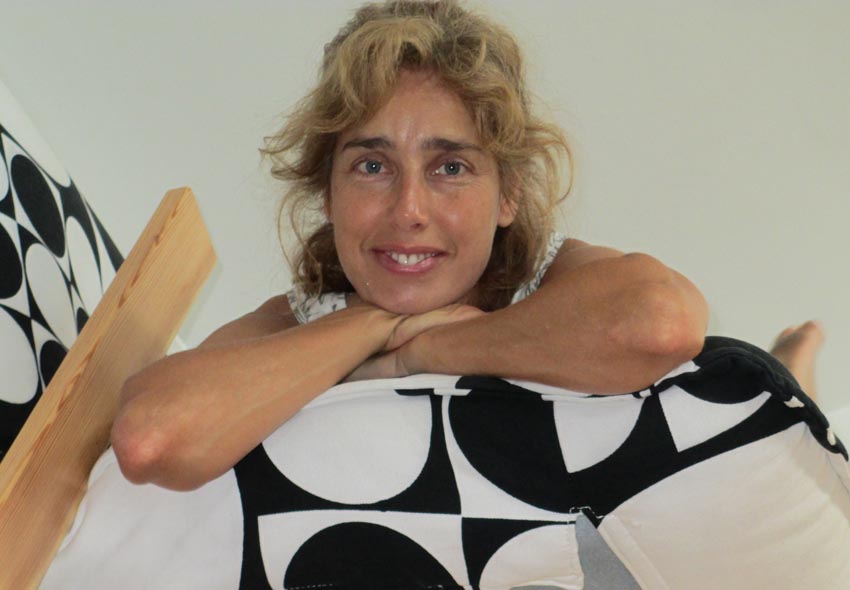Joseba Etxarri. Gemma has lived in Valencia for over 11 years She arrived after graduating in psychology at the University of Salamanca specializing with Masters in Behavioral Therapy and Sports Psychology. After a three-year experience in a Behavior Therapy Center in Spain, this 44-year old Basque psychologist settled in Valencia where she has developed her professional life, including much work in the area of assertiveness and linguistic behaviors in bilingual societies. Author of nearly a dozen books, alone and with others, Gemma wanted to transmit Basque to her two daughters and in virtue of this commitment she became the Basque professor at the Euskaltzaleok Basque club where an enthusiastic group of Basque-Valencians maintain and disseminate their double identity as Basques and Catalan/Valencian.
-I red on the internet about your professional side as a psychologist in aspects such as sports psychology, specifically with Valencian pelotaris…
I’m not sure to what extent is known outside of Valencia, but Valencian pelota is a specific kind of pelota that is very popular and widespread here. It is very different from Basque pelota, but at times pelotaris of both places have come together to compete or to play each other for fun or as an exhibition. Sports psychology is part of my activity. Three years ago we had an interdisciplinary cabinet at the University where we worked together a doctor, a physical therapist, a trainer, and a psychologist, but budget cuts ended that. I continue to attend sportpeople by myself right now, for example those that do Taekwondo, an athlete and several pelotaris.
-There are also various references to TELP workshops that you teach and the concept of linguistic stress. What is linguistic stress?
It is something that Basque speakers have in common with Kurds, Catalan, or whatever other minority language. When someone speaks two languages, one strong and protected and the other a minority one, you can feel an obligation to live asking permission to speak it, or feel that you don’t have the right to speak your language, and the stress occurs because you feel obliged to choose one or the other, most frequently the stronger language. This is usually linked to another concept, linguistic submission that results in us not speaking our language, despite having all the rights to do so, and opting for the other. It also occurs in areas where the number of speakers of the minority language is large, in the case of Basque let's say not just in places like Bilbao, where the number of Spanish monolinguals is high, but also in areas where the most of the population speaks Basque. This is something that doesn´t care to monolingual Spanish speakers, but that can gravely affect a bilingual population, to their detriment.
-You mentioned it in the book Come out of the Linguistic Closet, that you wrote with Ferran Suay.
It is a book that we published in 2010, in Barcelona and it is already in its third Catalan edition, with an echo and notable critical success. In it, we analyze, from psychology the testimony and the behavior of six Catalans that tell us their experience as speakers of Catalan. The Basque version is already ready and I think we will be able to announce its publication shortly.
-Today you are an Euskaldun. You learned Basque by choice.
I was born in Bilbao to a family that lived with its back turned to Euskera. Then when I was 17, I decided to enroll in AEK to learn it. I took various courses until I was 20 and did a barnetegi and I attained an acceptable level. Later I left to study in Salamanca and I had to park it until, in Valencia, I told myself to recuperate it, and teach it to my daughters. Motherhood and my love for Euskera brought me to, and got me involved in the Valencia Euskaltzaleok Basque club, and commit myself to Basque classes that I teach today.
-Korrika 19 will come to Valencia next week, thanks to the Euskaltzaleok and Laurak Bat Basque clubs.
This will be our third edition of Korrika in Valencia. We will do it next week, on Saturday [right now Valencia is celebrating its internationally known Fallas festival, every year around Marc 19th]. On March 28th, starting at noon, we will be accompanied by dantzaris, and trikitilaris from the Basque Country along with dolçainers and tabalers from Valencia, which are similar to txistulariak or dulzaineroak or danbolinderoak in Euskadi. They will move through the Velluters neighborhood streets, where the Basque club is located, in Raco de la Corbella and then Korrika will begin at 1pm. We are expecting between one and two hundred people. Following there will be a meal based on marmitako, with cider brought from the Basque Country, a presentation on Korrika, music, song, and a concert by Basque singer Josu Bergara and the the Valencian singers Pau Alabajos and Ali Farnat. We will also have the participation of a typical muixeranga (human tower).
-Why Korrika in Valencia?
Because we are Basque. I think that many Basques in the world, and among them those that gather in Basque clubs like ours, we can and we want to add our efforts to those who participate, run, organize and make Korrika possible in Euskadi. We want to contribute to our language and culture wherever we are. So we have purchased bibs and the proceeds will be sent to the Basque Country. We also want to show others we live with who we are, and what our language is like, our commitment to our culture and how it unites us. We will invite others to celebrate, and we will mix our ways and cultures, but each will contribute from his or her own, from what we are and what we feel.






 Send to a friend
Send to a friend Add comment
Add comment








